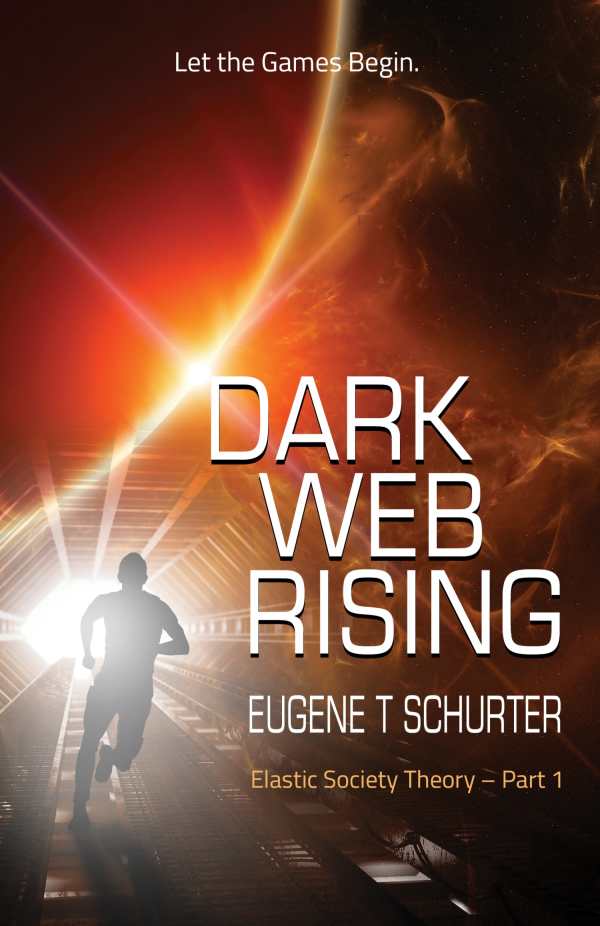
Dark Web Rising
Elastic Society Theory Part 1
Dark Web Rising achieves the rare feat of hacking scenes written in a compelling, captivating way.
Eugene T. Schurter’s Dark Web Rising is a fast-paced science fiction thriller that spins a web of intrigue centered around hacking, espionage, conspiracy, political philosophy, and interplanetary colonization.
Schurter’s novel is a page-turner, a possible glimpse into the future that feels grounded in existing technologies. It’s an ambitious book that looks beyond Earth to the stars for habitable planets that may someday supplement or supplant humanity’s current home.
The novel follows Stewart Breston, a talented coder who accidentally hacks the unhackable secret government agency Net Watch, making himself a target. He goes on the run, hunted by covert agents who go only by computer identities. It’s a cat-and-mouse game between a gifted computer prodigy and a shadowy authoritarian power with seemingly unlimited resources.
As a fugitive, Breston finds allies in the secretive benefactor Daddy Warbucks and a loose-knit group known as JM Net that subscribes to John Marshal’s Elastic Society Theory, a quote from which precedes every chapter. Meanwhile, the Genesis II ship, capable of traveling “ten times the speed of light,” is colonizing space.
This is an action-packed book that does not skimp on adventure. Even in the heat of pursuit, the protagonist earns an emotional investment, coming across as a relatable young individual thrust into extreme circumstances and searching for a feasible way out. Breston feels real, whether he is brooding, swooning, programming, or acting on “true belief, not conditioned response.”
Prose flows crisply and cleanly. Scenes, especially when involving the heightened tension of surveillance and tracking, crackle with excitement, as if straight out of a television show. Dark Web Rising achieves the rare feat of writing hacking scenes in a compelling, captivating way that feels realistic and high-stakes without getting bogged down too much in the technical aspects.
Strong world-building establishes settings like the Egg and the Central Security Agency Net Watch Operation Center in lavish detail, to the point where they’re easy to visualize. The snippets of Marshal’s philosophical treatise that precede every chapter go a long way toward creating a broader fictional universe that surrounds the story. The philosopher himself feels like a full-fledged, well-drawn character in a future world.
Dialogue rings largely true but includes the occasional clunker such as an extended rationalization of grabbing a bite to eat in the middle of a hacking session. Generally, the dialogue moves the story along, but it sometimes feels bogged down with obtrusive exposition.
The book gives even some villains fully developed interior lives and motivations, though other characterizations are sometimes thin and some characters feel like they operate in service of the plot rather than drive it. A romance comes across as forced and unearned. Clichés, anachronisms, and gratuitous politicizing are distracting. But these minor flaws are few.
The novel touches upon interesting technology, including retina scanners, nanotechnology, esheets, and drones “the size of houseflies.” Though a physicist might sniff at the space flight descriptions, much of the book feels like extrapolative fiction that’s grounded firmly in the present.
Dark Web Rising is engaging science fiction with serious intentions that envisions a believable future.
Reviewed by
Joseph S. Pete
Disclosure: This article is not an endorsement, but a review. The publisher of this book provided free copies of the book and paid a small fee to have their book reviewed by a professional reviewer. Foreword Reviews and Clarion Reviews make no guarantee that the publisher will receive a positive review. Foreword Magazine, Inc. is disclosing this in accordance with the Federal Trade Commission’s 16 CFR, Part 255.
